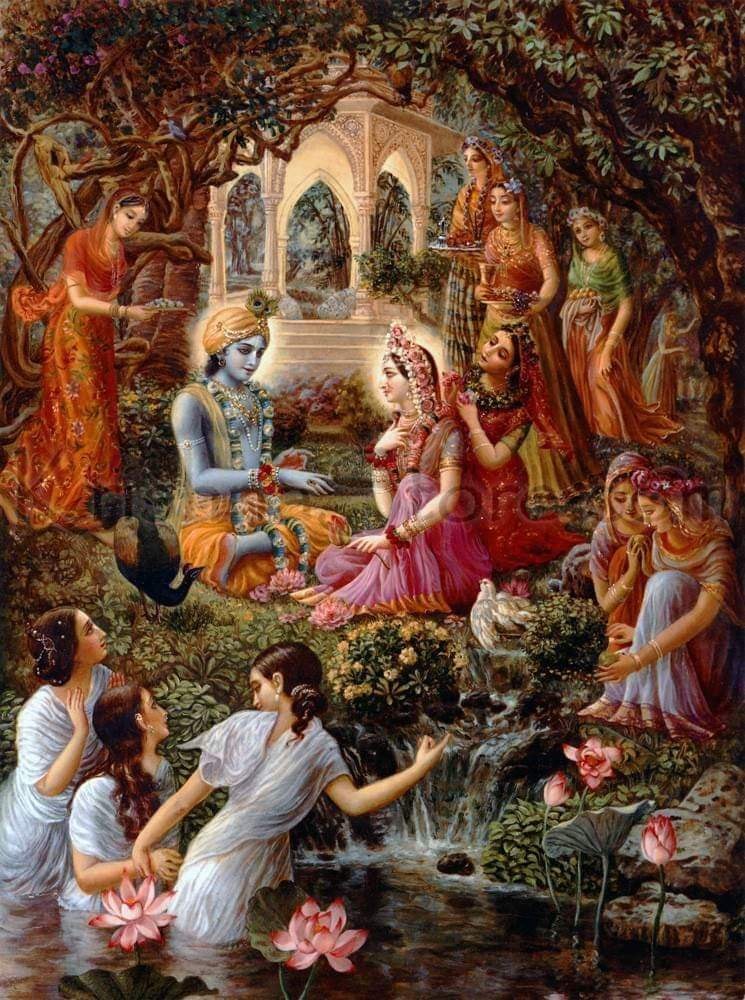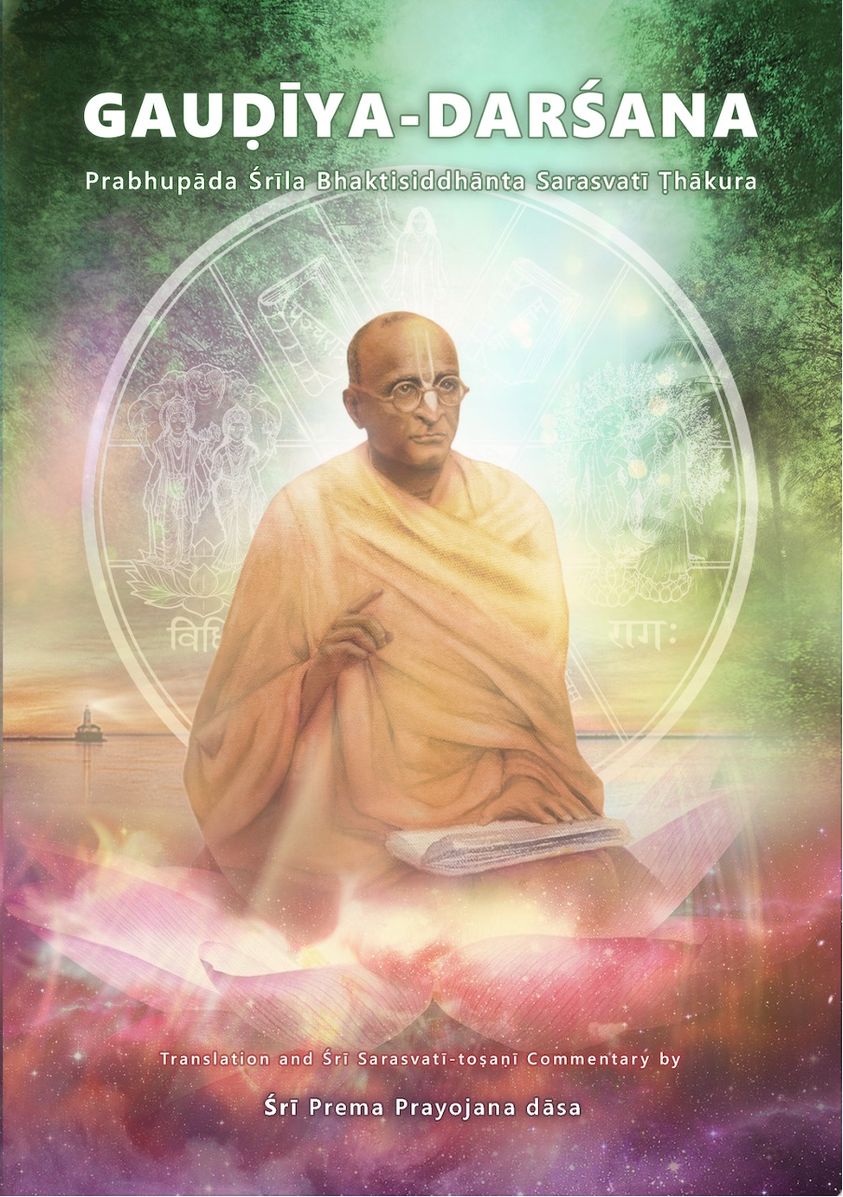By
Srila Bhakti Raksaka Sridhara Maharaja
Devotee: Why is it that Sankaras philosophy has so much appeal to people in general?
Srila Sridhar Maharaj: It is a compromise; it apparently gives harmony to all the sections of worshipers of different types of gods. There are so many worshipers of so many gods; and Sankara harmonises them: What you are doing, it is alright you are worshiping Kali, or you are worshiping Ganesa, or Surya, or
Agni, or Visnu all is good, I accept all but that is only for the time being, and to a certain extent. But finally, your attempt will end in the attainment of brahma.
If you can accept this as the final end, I accept you all. Because of this compromise, Sankaras thought is widely accepted by the atheistic section; you can understand it in this way. And as I have mentioned, Sankara showed the colour of accepting the Veda and Upanisad, but he gave this sort of meaning, that everything ends in brahma; and through that, he apparently harmonised and embraced them all.
Another thing which contributed to his popularity was that he was brilliant, an intellectual giant, and he fought against the Buddhistic thinkers who were out-and-out atheists; with the colour of theism, he fought against the atheist number one, the Buddhist. And his success in that gave him much popularity.
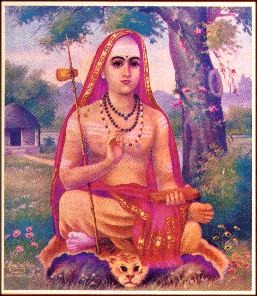
Adi Shankara
Devotee: There appear to be so many different religions, all under the banner of theism. This is often confusing for the general public. Sometimes the Vaisnava is asked: Why are there so many different religions, theistic religions? Someone is worshipping Allah, someone is worshipping Christ there seem to be so many differences. How should he reply?
Srila Sridhar Maharaj: According to the different levels of theistic receiving capacity of the people, different groupings are there. And the truth is distributed in installments, accordingly.
Those who are materialistically inclined generally worship the demigods to attain so many benefits:
kamais tais tair hrta-jnanah
prapadyante nya-devatah
tam tam niyamam asthaya
prakrtya niyatah svaya
(BG 7:20)
Persons whose good intelligence has been spoiled by illicit desires for exploitation and renunciation or other duplicitous pursuits, worship other godly personalities such as the Sun-god and the many demigods. Being enslaved by their instinct, they adopt the corresponding rules and regulations of such worship, accordingly.
This is called upasana worship. But the Vaisnavas are nirupasana; they do not follow that line. Those who follow the upasana are worshiping the demigods who are in possession of some power of nature in order to get, by their grace, their desired end. Those who seek good health go to Surya; for general satisfaction of any lusty desire, they go to Kali; for property and resources, to the fire-god, Agni; and those who want knowledge, go to Siva. Lord Siva has got versatile knowledge in medicine, in yoga, in music, and also in indifference, and penance all these many qualifications are combined, are concentrated in him.
So, many go to worship Siva for knowledge. And those that want mukti, liberation, they go to Visnu, Narayana. But the Narayana of the followers of Sankara, he is also under maya, a part of maya. According to them, Siva himself is also such; but, Siva is trying to get out of maya, to become master of maya. In this way they represent him.
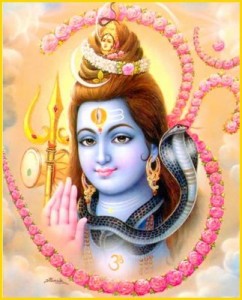
Lord Shiva
According to their choice, their inner necessity while wandering in different stages of misunderstanding, people will select their leader: O, he will be best able to help me. My aim is this side, in this direction, so I should go to him. Just as one who wants to be a good football player will naturally go to the most qualified leader in that field; one who wants to be a good merchant, he must go the expert, and who wants to be a scholar, a research scholar, he must similarly go to the most qualified in that area. Those whose minds are influenced by various material desires will approach those respective leaders and surrender to them (kamais tais tair hrta-jnanah, prapadyante nya-devatah).
And for those who want real theistic life, there are also instalments. In Mohammedanism, in Christianity, there is theism, they accept the eternity of God, one eternal God, eternal Master; but that acceptance is according to their nature, as a group. Just as there is brahmana nature, ksatriya nature, vaisya nature and so on; according to the different general nature of the different nations, they have been given such instalments in theism. In Srimad Bhagavatam we find that instalments are given, are distributed, according to the receivers capacity collectively, as a group.
Otherwise, if the whole is given at once, it will be too difficult, too complex for them to understand or to follow. So for the beginners, some theistic conception has been given only approximately and not in detail. After attaining further birth and rebirth, when they will come to a higher position, then higher education about theism will be imparted to them. With such a policy, arrangement has been made for everyone by the Lord, through the various scriptures and saints. This is why we find Vedic knowledge- Truth existing beyond our present senses- presented through the scriptures in an indirect, veiled manner in order to instruct those who are undisciplined or foolish. People are to be dealt with according to their stage. A boy should be given the standard of examination of a boy, not of a grown-up man. The questions in a boys examination will be of a different standard than those in the adults. Gradually one will be taken to the higher standard. Just as a child is guided with some modified policy, similarly that sort of process has been adopted in the scriptures:
paroksa-vada vedo yam
balanam anusasanam
karma-moksaya karmani
vidhatte hy agadam yatha
(SB 11:3:44)
Childish and foolish people are attached to materialistic, fruitive activities, although the actual goal of life is to become free from such activities and attain Krsna consciousness, the service of Krsna. Therefore, the Vedic injunctions indirectly lead one to the path of ultimate liberation by first prescribing fruitive religious activities, just as a father promises his child some sweets so that the child will take his medicine.
Everywhere in the revealed scriptures this has been accepted: according to the audiences capacity, the degree of education should be imparted, extended to them. Otherwise, they won’t be able to understand anything. There is a gradual process in the training this is so everywhere; it is true in our common experience also. Progress does not come abruptly but it is a process of continuous development.
Please chant the Hare Krishna Maha Mantra and become happy

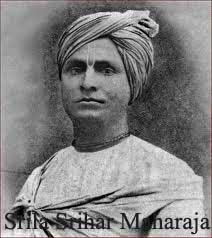
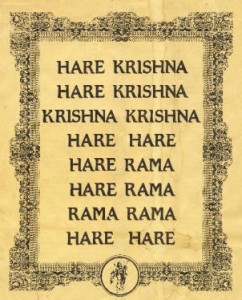
 Posted in
Posted in 






